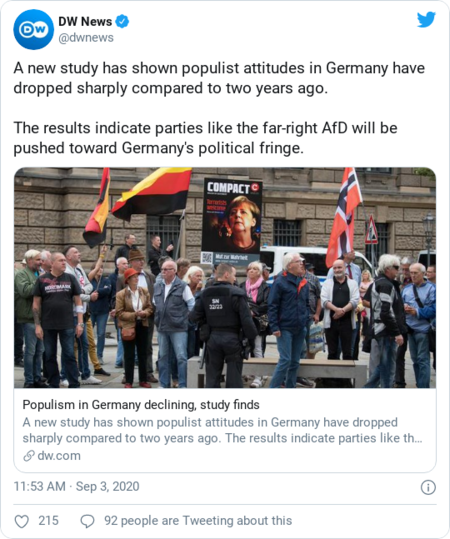
German Chancellor Angela Merkel and President Trump at NATO headquarters in Brussels on July 11, 2018. (Markus Schreiber/AP)
|
“I’ll put it simply,” German Chancellor Angela Merkel declared at the end of August 2015. “Germany is a strong country. … We can handle this.”
“This” was an epochal influx of migrants and refugees, mostly from Syria, Afghanistan and Iraq. Their exodus from the Levant and North Africa had led to chaotic scenes in countries along Germany’s borders, through which tens of thousands of people were making a trek to greater safety after entering Europe in Greece and Italy. The situation threatened to buckle the continent’s system of internal open borders.
What Merkel famously believed Germany could “handle” was an embrace of hundreds of thousands of desperate migrants. In her rhetoric, it was both a political and moral necessity. Opinion polls in Germany at the time showed majority support for Merkel’s approach. Authorities in Berlin went about trying to find homes for upward of a million new arrivals and integrate them into German society. For her courage and decisiveness, Time magazine named Merkel its 2015 Person of the Year.
The backlash, though, was swift and lasting. Far-right politicians in Europe seized on the willingness of politicians like Merkel to open the gates to foreign — and mostly Muslim — migrants as a kind of betrayal. In a matter of months, public opinion turned against Merkel as instances of violence linked to the migrants dominated headlines and inflamed European politics. The influx of asylum seekers gave momentum to the once-fringe far-right Alternative for Germany party, or AfD, which became Germany’s largest opposition party in parliament in 2017.
Across the Atlantic, President Trump also joined the fray. In 2015, as a challenger for the Republican nomination, he used incidents like the Islamic State-plotted attack in Paris — which involved a handful of assailants who had taken the same refugee route from Syria — to justify proposals to cancel the United States’ own refugee programs and even block all Muslim travel to the country. The unvarnished xenophobia of his pitch galvanized a right-wing base and lifted him to the presidency.
Now, new data disproves the hysteria of Merkel’s anti-immigration critics. There’s an integration success story to be told. “More than 10,000 people who arrived in Germany as refugees since 2015 have mastered the language sufficiently to enroll at a German university,” the Guardian reported. “ More than half of those who came are in work and pay taxes. Among refugee children and teenagers, more than 80% say they have a strong sense of belonging to their German schools and feel liked by their peers.”
Nor did this influx of arrivals prove more difficult to assimilate than earlier migrant communities. “By 2018 43 percent of the working-age asylum seekers who arrived between 2013 and 2016 were in work or training (compared with over 75 percent for the same age group in Germany as a whole)—better than the wave of refugees from Yugoslavia in the 1990s,” noted the Economist.
The German chancellor, a center-right politician, was never the nation-smashing radical Trump and some of her domestic opponents claimed her to be. In speeches, she spoke skeptically of the idea of “multiculturalism”and quietly moved to cut off future influxes of migrants by brokering an E.U. deal with Turkey.
“Merkel is accused of ‘opening borders’ and inviting migrants into Germany when in fact they had long been on their way and crossed an Austrian-German border that had been open for decades,” wrote Paul Hockenos, a Berlin-based journalist. “Moreover, in rhetoric that extends beyond conservative circles, the 2015-2016 refugees (and indeed most refugees) are deemed ‘economic migrants,’ namely people looking for better jobs in richer countries.” But that was statistically not the case: 85 percent of the 1.3 million people claiming asylum in Europe in 2015 came specifically from war-torn nations like Syria, Iraq, Afghanistan and Eritrea.
Moreover, the fearmongering over Islamist extremists proved to be just that. “We know that some of the men involved in the [2015 Paris] attack had exploited the chaos to smuggle themselves into Europe, in some cases posing as Syrian refugees,” Peter Neumann, a terrorism expert at King’s College London’s Department of War Studies, told the Guardian. “We also knew that the vast majority of people who arrived were young men, the very demographic that is most susceptible to radicalization. And yet, we can now say that the worst fears haven’t come true.”
 |
|
Instead, there has been a clear uptick in far-right mobilization and violence in Germany, including a deadly rampage in February by a right-wing terrorist who killed nine people in a suburb of Frankfurt. “We have not had the Islamist terrorist attacks in quantity that had been predicted,” said Constanze Stelzenmüller of the Brookings Institution in a Thursday webinar. “What we have had is an increase in right-wing extremism and anti-Semitic extremism.”
The AfD’s political fortunes have waned of late, while Merkel, who plans to step down next year after first becoming chancellor in 2005, remains astonishingly popular for a democratically elected Western leader. Depending on the outcome of the United States’ November election, she may outlast the American president who vilified her politics. “I admire her for the ease with which she has been able to let go of power,” Stelzenmüller said. “... Unlike many, many politicians you and I can think of, she’s not needy.”
Nor does she seem to regret her fateful decision in 2015. “I would make essentially the same decisions,” Merkel said earlier this summer, speaking of the purgatory that so many asylum seekers seemed to face. “When people are standing at the German-Austrian border or the Hungarian-Austrian border, they have to be treated like human beings.”
| 



Nenhum comentário:
Postar um comentário